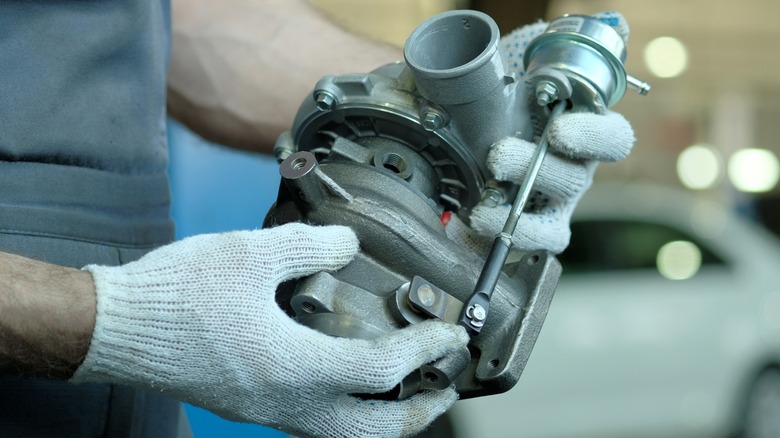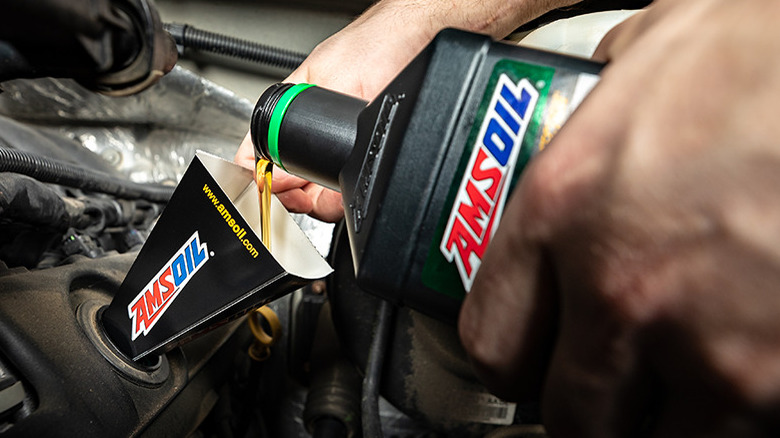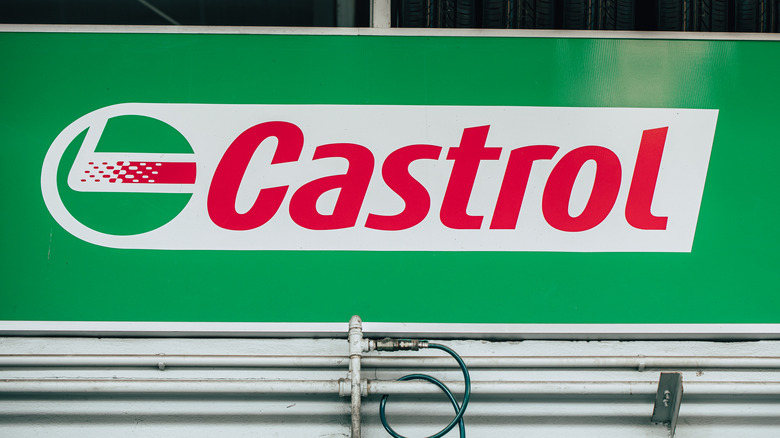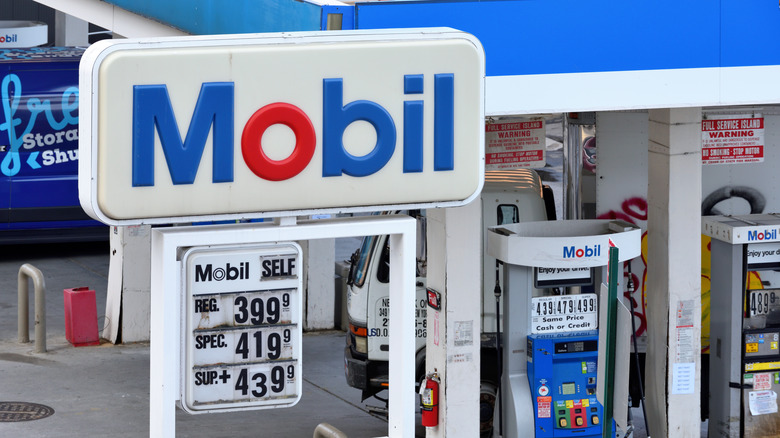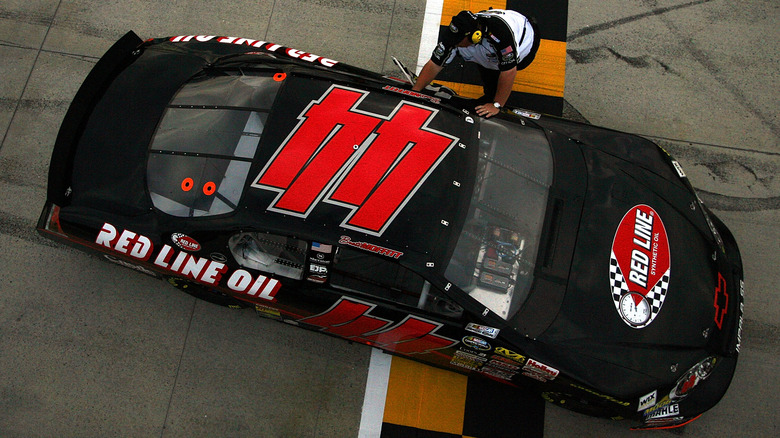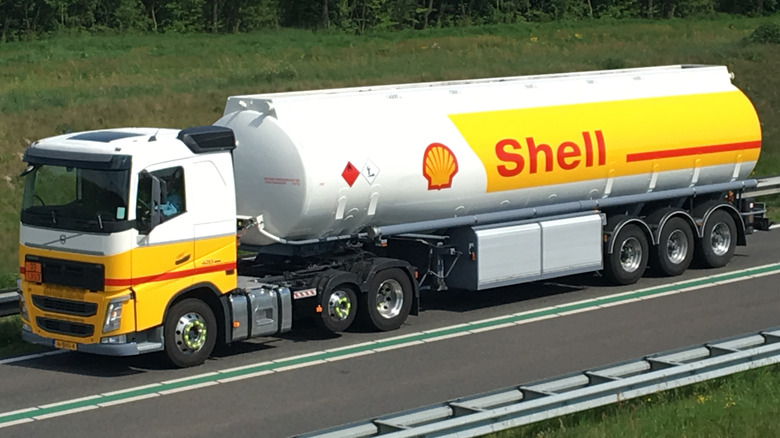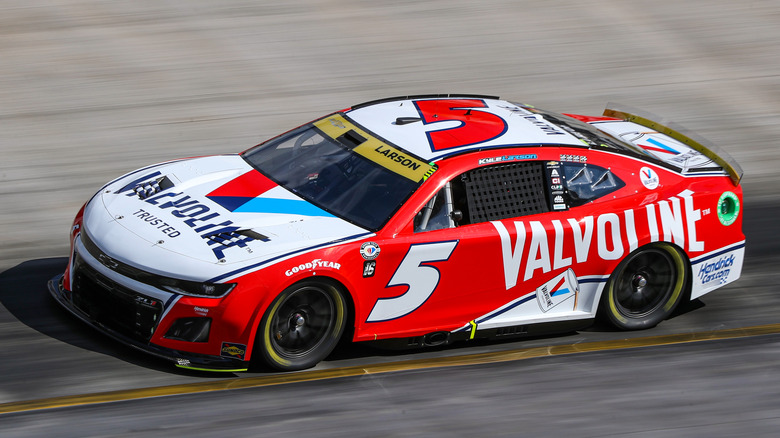8 Of The Best Motor Oil Brands For Turbo Engines
We may receive a commission on purchases made from links.
Turbocharged engines are nothing new — the systems have been around since the late 1800s, first applied to airplane engines and eventually to passenger vehicles in the '60s and '70s. The idea is pretty simple: the unit is connected to the engine at the exhaust manifold. Exhaust gasses spin a turbine, pulling air through the intake and then moving it into the engine's combustion chambers. More air in the chamber requires more fuel to be injected to maintain the proper ratio, and that increase results in more power being produced. The result is an improvement in both fuel efficiency (during normal driving conditions) and horsepower.
A side effect of this added power is a massive amount of added heat. The average vehicle hits redline at about 6000 rpm; by comparison, a turbo can spin closer to 300,000 rpm. The exhaust gasses spinning the turbo can get over 1,000 degrees Fahrenheit, and this combination of obscene speed and excessive temperatures can result in damage to the turbo if it's not properly lubricated. While intercoolers and oil coolers help, it's ultimately the job of engine oil to keep everything running smoothly.
Fortunately, several oil manufacturers make a point to test their full synthetic lubricant options specifically to combat turbo coking and overheating. Here are some of the best.
AMSOIL
AMSOIL is notable in that it makes a point to educate its customers. The independent American company's blog is informative and focuses on several issues common to newer vehicles, including low-speed pre-ignition, a kind of engine knock that occurs in turbocharged GDI engines. LSPI is a premature explosion that is believed to be a result of ultra-hot droplets of oil or fuel getting into combustion chambers, and the force of that explosion on a piston moving in the opposite direction can result in damage or destruction of the pistons or rods. Those droplets get in there because of little deposits that can be prevented using quality oils — AMSOIL acknowledges this science and shares test results of its products on its website as well.
LSPI is an industry-wide concern, and General Motors led the charge in manufacturers demanding better performance from its oils, requiring lubricants to pass its own LSPI testing to attain GM Dexos branding. Turbo engines benefit from AMSOIL's Signature Series synthetic oils. Tests show that AMSOIL's products protect 72% better than the requirements set forth by GM Dexos 1 and 2. As recently as 2022, GM introduced Dexos R specs specifically for engines in its Camaros and Corvettes — AMSOIL's Signature Series already surpassed those performance requirements as well.
Castrol
A large brand that's been around since 1899, Castrol has long been a player in the oil game. However, it's the company's newer additions to its lineup, like Castrol Edge, that lean into solving the issues that turbocharged engines can present. Smaller engines that output more power, like a turbocharged four-cylinder, require lubricants that can withstand incredibly high temperatures. Castrol's tests on its full synthetic Edge oils show six times better wear protection and 10 times better high-temperature performance when measured against API standards.
The list of industry standards that Castrol Edge meets or exceeds is impressive, as well. API SP/SN PLUS/SN, ILSAC GF-6, GM Dexos 1 Gen 3, Ford, and Chrysler standards are among the 11 benchmarks the Castrol synthetic 5w30 surpasses. With such a wide variety of automakers' specifications met it's no wonder that many enthusiasts suggest Castrol for turbocharged engines, as it hits a balance between high performance and reasonable prices, even on its best synthetic oils.
Liqui Moly
Germany's most popular brand of motor oil is Liqui Moly, a company that got its start in 1957 making oil additives. It has since gone on to produce a wide range of motor oils, additives, and car care products. Its synthetic motor oils are highly rated on Amazon, and while the products are a little pricey, the performance is backed up by years of development, testing, reviews, and awards. Even the packaging is often praised by buyers due to the creative addition of a pour spout in the unique bottle design of most of its motor oils.
While most of Liqui Moly's oils have been tested to perform well in the extreme temperatures that turbocharged engines generate, the company does have a Low Friction Turbo option that it tested for use with catalytic converters as well as turbochargers. BMW forum users also have a high opinion of Liqui Moly, as the company has a great reputation among European motorists. Liqui Moly also produces an additive specifically for new or repaired turbochargers, designed to stick to the surfaces of the turbo while engine oil hasn't yet had time to lubricate its bearings. While that's not a maintenance product like engine oil, it does highlight the focus Liqui Moly puts on turbochargers in its development labs.
Mobil
The standard for high-quality motor oil, and at the top of many ranked lists, including SlashGear's synthetic oil ranking, is Mobil 1. Turbocharged engines also benefit from this over-engineered full synthetic oil, as evidenced by forum posts and the company's own research.
Mobil uses two tests to verify the performance of its lubricants in high-temperature turbocharged engines. One is their proprietary test, the Mobil Thin Film Oxidation test, which verifies the thermal stability of an oil. Those lubricants with lousy thermal stability will leave a residue that will build up in a turbocharger, blocking oil passages and eventually resulting in turbo failure.
The second test Mobil uses is the Honda Hot Tube test, a test made by the automaker and used industry-wide. That test measures an oil's resistance to deposit formation within a turbocharger, an important feature of turbo lubricants, as deposits can quickly lead to damage in that extremely hot environment. Mobil boasts that its Mobil 1 advanced full synthetic oils provide superior protection in both tests, making for a great option in turbocharged engines.
Mobil also is the first fill for many automakers who use turbocharged engines. Models that ship with Mobil 1 in their engines include the Nissan GT-R, Chevy Corvette, Porsche Boxster, and Aston Martin Vanquish, along with several McLarens, Mercedes, and Bentleys.
Red Line
Born in 1979, Red Line got its start making lubricants for the racing industry. It's been expanding ever since, now boasting a line of more than 100 motor oils, additives, and lubricants. In that time, Red Line has never lost focus on its racing history, using what it learns on the track to aid in the development of many of its popular fluids.
Red Line is well known among racing enthusiasts for its high-performance products. That focus bleeds into the company's line of fully synthetic motor oils, with several of its motor oils specifically mentioning their popularity in turbocharged applications, as well as their ability to reduce low-speed pre-ignition. Red Line also notes that the Professional Series is designed to protect against turbocharger deposits.
Not all of Red Line's oils are for track days and drag strips, either. The company's line of Professional Series motor oils meet or exceed GM, Chrysler, and Ford recommendations while also resisting high-temp thermal breakdown. Amazon reviews are consistently high, and pricing falls into the middle range of the products offered on our list.
Royal Purple
Royal Purple is a fully synthetic motor oil brand that's been in business since 1986. It's generally regarded as a great motor oil, with a history of quality and a unique formulation of additives (and some purple dye) meant to increase the film strength of the product. While the company reports that its motor oil can improve fuel efficiency, extend oil change intervals, and increase power, readers of this list will find one stat particularly impressive — Royal Purple's film strength is up to 400% than others, important in protection against the high temperatures produced by turbochargers.
Royal Purple is a brand that brings strong opinions out of seasoned gearheads. That's mostly due to its premium pricing, but RP is a premium product with a 4.9-star average among over four thousand reviews on Amazon. Only available as a full synthetic, Royal Purple sports API/ILSAC oil license and GM Dexos 1 Gen 3 approval, meaning warranties won't be affected by its installation. More importantly, Royal Purple claims that the additives in its High Performance oils were designed to specifically address low-speed pre-ignition issues and maintain turbocharged engines.
Shell
As one of the largest oil companies in the world, Shell should be expected to show up on our list. Its motor oils are available practically everywhere, and the quality of the product is as well-regarded as its reasonable prices. But it is the company's focus on exceeding manufacturer requirements for turbocharged engines, as well as the versatility of its motor oil lineup, that earns Shell a recommendation from us.
Shell's Full Synthetic 5w30 meets manufacturer warranty requirements, and the company makes a point to mention that it's great for turbocharged engines, protecting against low-speed pre-ignition and thermal breakdown. Turbo-diesels benefit from T6's soot protection and acid control, as well. Forum-dwellers also frequently mention Shell's Rotella T6 for turbocharged diesel engines, citing great results in older Audi and Volkswagen vehicles. It's extremely well-rated on Amazon with over 10,000 reviews, and at under $24 a gallon, it's practically a steal.
Valvoline
Valvoline markets itself as the first motor oil, as it was the industry's first trademarked oil brand way back in 1866. It's the number three motor oil brand in the DIY market, and it also claims to be the only motor oil brand with a dedicated, certified engine lab. Needless to say, Valvoline has been in the game long enough to have learned a thing or two about adapting to the ever-changing needs of motorists across the country and around the world.
Valvoline's Extended Protection Full Synthetic is one of the newest additions to the company's lineup, replacing its Modern Engine line of oils. This new formula addresses several of the issues prevalent in turbocharged engines. Valvoline claims it's 10 times stronger against breakdown than industry standards and offers 50% better wear protection. The company's proprietary cocktail of additives provides additional protections against deposits and heat, and the 5w30 version meets or exceeds ILSAC GF-6A, GM Dexos 1 Gen 3, and API SP, SN with SN PLUS, and SN standards, as well as Ford and Chrysler's standards.
Thousands of positive ratings and reviews on Amazon, including nearly 2,000 on the Extended Protection oil, which averages 4.8 stars, show that customers have had a lot of great experiences with the nearly two-centuries-old company. And for those users looking for protection for their turbo diesels, forum users often suggest Valvoline's Premium Blue line.
